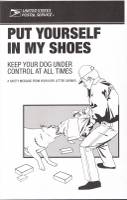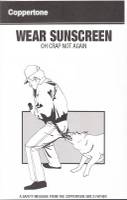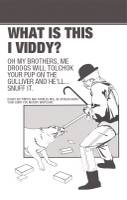Coming Friday, August 13th... Las Vegas, Nevada. More soon.
Tuesday, June 22, 2004
Yes, Pat...I'd like to buy a vowel...
 So now the terrorists are infatuated with beheading innocent people, eh? I think it's high time to bring a uniquely American form of terror back to the terrorists: Scalping!
So now the terrorists are infatuated with beheading innocent people, eh? I think it's high time to bring a uniquely American form of terror back to the terrorists: Scalping!
"The savage quickly seizes his knife, and makes an incision around the hair from the upper part of the forehead to the back of the neck. Then he puts his foot on the shoulder of the victim, whom he has turned over face down, and pulls the hair off with both hands, from back to front... When a savage has taken a scalp, and is not afraid he is being pursued, he stops and scrapes the skin to remove the blood and fibres on it. He makes a hoop of green wood, stretches the skin over it like a tambourine, and puts it in the sun to dry a little. The skin is painted red, and the hair on the outside combed. When prepared, the scalp is fastened to the end of a long stick, and carried on his shoulder in triumph to the village or place where he wants to put it. But as he nears each place on his way, he gives as many cries as he has scalps to announce his arrival and show his bravery. Sometimes as many as 15 scalps are fastened on the same stick. When there are too many for one stick, they decorate several sticks with the scalps."
Posted by
SixHertz
at
6:15 PM
|
![]()
Studies Show: You May Be Stupid and Not Even Know It!
Incompetence is bliss, say researchers
BY ERICA GOODE
New York Times
There are many incompetent people in the world. But a Cornell University study has shown that most incompetent people do not know that they are incompetent.
People who do things badly, according to David A. Dunning, a professor of psychology at Cornell, are usually supremely confident of their abilities -- more confident, in fact, than people who do things well.
One reason that the ignorant also tend to be the blissfully self-assured, the researchers believe, is that the skills required for competence often are the same skills necessary to recognize competence.
The incompetent, therefore, suffer doubly, the researchers -- Dunning and Justin Kruger, then a graduate student -- suggested in a paper appearing in the December issue of the Journal of Personality and Social Psychology.
``Not only do they reach erroneous conclusions and make unfortunate choices, but their incompetence robs them of the ability to realize it,'' wrote Kruger, now an assistant professor at the University of Illinois, and
Dunning.
This deficiency in ``self-monitoring skills,'' the researchers said, helps explain the tendency of the humor-impaired to persist in telling jokes that are not funny, of day traders to repeatedly jump into the market -- and repeatedly lose out -- and of the politically clueless to continue holding forth at dinner parties on the fine points of campaign strategy.
Some college students, Dunning said, evince a similar blindness: After doing badly on a test, they spend hours in his office, explaining why the answers he suggests for the test questions are wrong.
In a series of studies, Kruger and Dunning tested their theory of incompetence. They found that subjects who scored in the lowest quartile on tests of logic, English grammar and humor were also the most likely to
``grossly overestimate'' how well they had performed.
In all three tests, subjects' ratings of their ability were positively linked to their actual scores. But the lowest-ranked participants showed much greater distortions in their self-estimates.
Aiming high -- real high
Asked to evaluate their performance on the test of logical reasoning, for example, subjects who scored in only the 12th percentile guessed that they had scored in the 62nd percentile and deemed their overall skill at logical reasoning to be at the 68th percentile.
Similarly, subjects who scored at the 10th percentile on the grammar test ranked themselves at the 67th percentile in the ability to ``identify grammatically correct standard English'' and estimated their test scores to be at the 61st percentile.
On the humor test, in which participants were asked to rate jokes according to their funniness (subjects' ratings were matched against those of an ``expert'' panel of professional comedians), low-scoring subjects were also more apt to have an inflated perception of their skill. But because humor is idiosyncratically defined, the researchers said, the results were less conclusive.
Unlike their unskilled counterparts, the most able subjects in the study, Kruger and Dunning found, were likely to underestimate their own competence. The researchers attributed this to the fact that, in the
absence of information about how others were doing, highly competent subjects assumed that others were performing as well as they were -- a phenomenon psychologists term the ``false consensus effect.''
When high-scoring subjects were asked to ``grade'' the grammar tests of their peers, however, they quickly revised their evaluations of their own performance. In contrast, the self-assessments of those who scored badly themselves were unaffected by the experience of grading others; some subjects even further inflated their estimates of their own abilities.
``Incompetent individuals were less able to recognize competence in others,'' the researchers concluded.
In a final experiment, Dunning and Kruger set out to discover if training would help modify the exaggerated self-perceptions of incapable subjects. In fact, a short training session in logical reasoning did improve the
ability of low-scoring subjects to assess their performance realistically, they found.
The findings, the psychologists said, support Thomas Jefferson's assertion that ``he who knows best knows how little he knows.''
Such studies are not without critics. David C. Funder, a psychology professor at the University of California-Riverside, for example, said he suspected that most lay people had only a vague idea of the meaning of
``average'' in statistical terms.
But Dunning said his current research and past studies indicated that there were many reasons why people would tend to overestimate their competency and not be aware of it.
Concrete clues
In some cases, Dunning pointed out, an awareness of one's own inability is inevitable: ``In a golf game, when your ball is heading into the woods, you know you're incompetent,'' he said.
But in other situations, feedback is absent, or at least more ambiguous; even a humorless joke, for example, is likely to be met with polite laughter. And social norms prevent most people, when faced with incompetence, from blurting out, ``You stink!'' -- truthful though this assessment may be.
Posted by
SixHertz
at
11:22 AM
|
![]()
Wednesday, June 16, 2004
Xanga no more
I have moved my web log from Xanga to Blogspot. Enjoy!
Posted by
SixHertz
at
4:56 PM
|
![]()
Creative Photoshopping
Ever get one of these pamphlets from your USPS letter carrier?

Original USPS dog control pamphlet

Coppertone Creation

Clockwork Orange Creation
Posted by
SixHertz
at
4:34 PM
|
![]()
